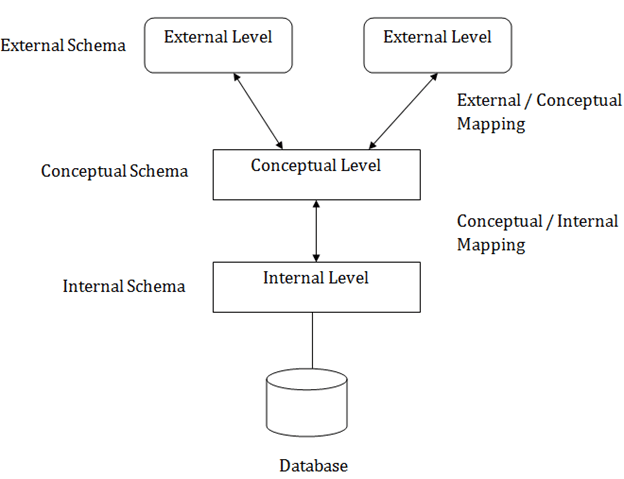Three schema Architecture
- The three schema architecture is also called ANSI/SPARC architecture or three-level architecture.
- This framework is used to describe the structure of a specific database system.
- The three schema architecture is also used to separate the user applications and physical database.
- The three schema architecture contains three-levels. It breaks the database down into three different categories.
The three-schema architecture is as follows:

In the above diagram:
- It shows the DBMS architecture.
- Mapping is used to transform the request and response between various database levels of architecture.
- Mapping is not good for small DBMS because it takes more time.
- In External / Conceptual mapping, it is necessary to transform the request from external level to conceptual schema.
- In Conceptual / Internal mapping, DBMS transform the request from the conceptual to internal level.
1. Internal Level
- The internal level has an internal schema which describes the physical storage structure of the database.
- The internal schema is also known as a physical schema.
- It uses the physical data model. It is used to define that how the data will be stored in a block.
- The physical level is used to describe complex low-level data structures in detail.
2. Conceptual Level
- The conceptual schema describes the design of a database at the conceptual level. Conceptual level is also known as logical level.
- The conceptual schema describes the structure of the whole database.
- The conceptual level describes what data are to be stored in the database and also describes what relationship exists among those data.
- In the conceptual level, internal details such as an implementation of the data structure are hidden.
- Programmers and database administrators work at this level.
3. External Level
- At the external level, a database contains several schemas that sometimes called as subschema. The subschema is used to describe the different view of the database.
- An external schema is also known as view schema.
- Each view schema describes the database part that a particular user group is interested and hides the remaining database from that user group.
- The view schema describes the end user interaction with database systems.




No comments:
Post a Comment